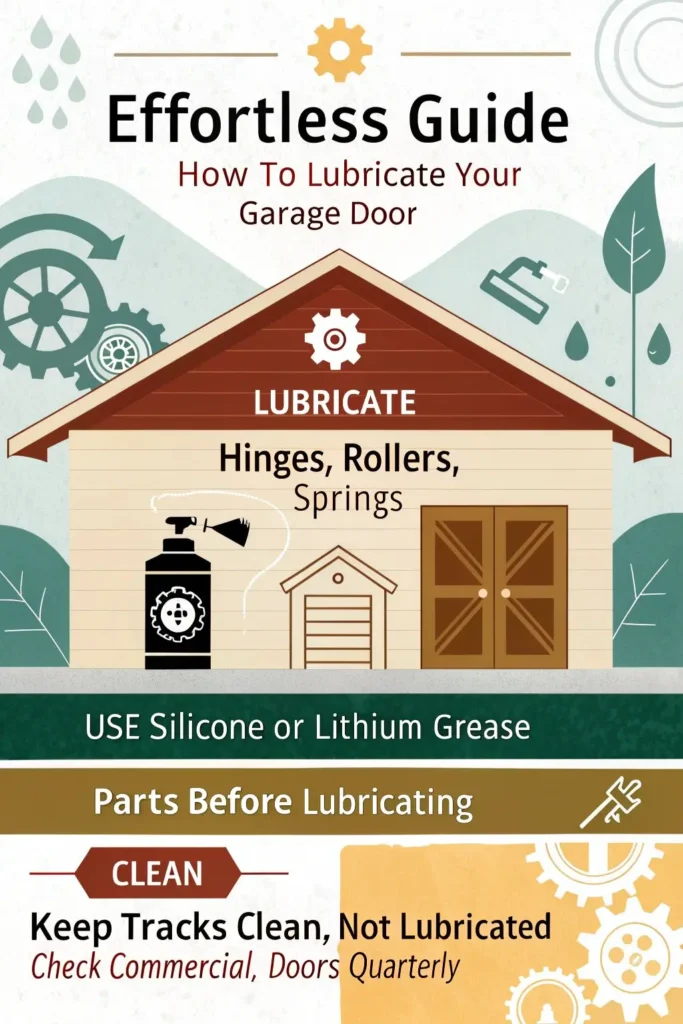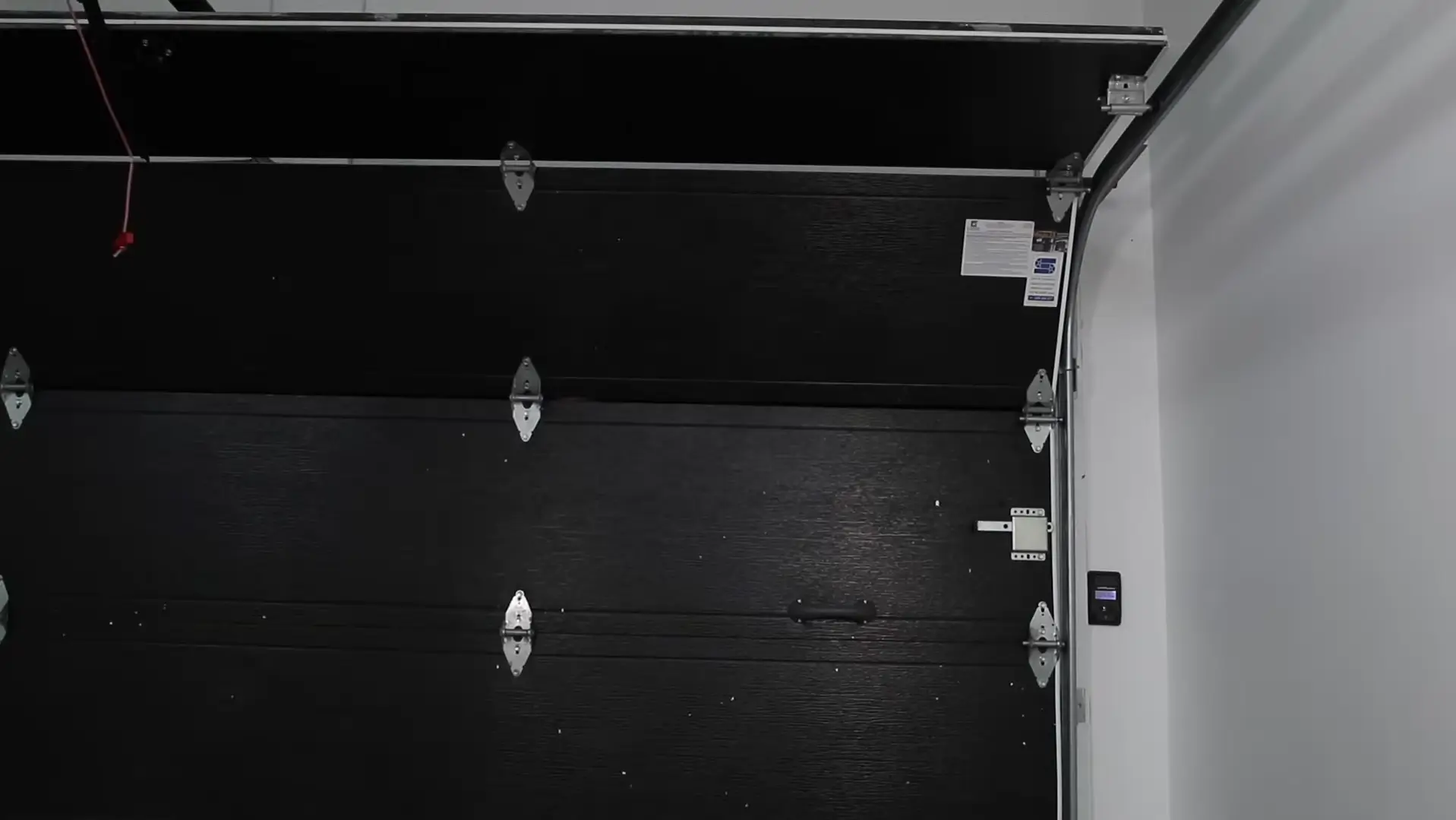Is your garage door making loud noises? A squeaky garage door can be a real pain. Lubricating your garage door is key to keeping it quiet and working well. This guide will show you how to lubricate your garage door step by step.
Get ready to fix that noisy door!
Key Takeaways
- Lubricate garage door hinges, rollers, springs, and bearing plates every 3-6 months to keep the door working smoothly and quietly.
- Use silicone sprays for rubber, plastic, and metal parts, or white lithium grease for metal-on-metal surfaces.
- Clean all parts before applying lubricant to ensure it works well and doesn’t attract more dirt.
- Don’t lubricate the tracks; keep them clean and dry instead.
- Commercial garage doors need more frequent care, with checks at least four times a year due to heavier use.

Identifying Garage Door Parts That Require Lubrication
Garage doors have many parts that need lubrication. You must know which parts to grease to keep your door working well.
Hinges and Rollers
Hinges and rollers play a key role in your garage door’s smooth operation. These parts need regular care to work well. Hinges connect the door panels and allow them to bend as the door opens and closes.
Rollers fit into the tracks and help the door move up and down easily. You should oil these parts every 3-6 months to keep them in top shape.
Proper care of hinges and rollers can prevent costly repairs down the road. Use a silicone-based spray or white lithium grease to lubricate these parts. Be careful not to use too much, as excess lube can attract dirt.
For nylon rollers, skip the oil and just keep them clean. This simple upkeep will help your garage door run quietly and extend its life.
Springs and Bearing Plates
Springs and bearing plates play a key role in your garage door’s smooth operation. These parts need regular care to work well. You should check them every 3-6 months for any signs of wear or damage.
If you spot issues, call a pro right away. To keep these parts in top shape, use a silicone-based spray or white lithium grease. Apply a thin layer to the springs and bearing plates.
This helps reduce friction and noise when your door moves. Make sure not to over-lubricate, as this can attract dirt and grime.
Choosing the Right Lubricant
Picking the right lubricant is key for your garage door’s health. You’ll need to choose between silicone sprays and white lithium grease based on your door’s needs.
Silicone Sprays vs. White Lithium Grease
Choosing the right lubricant for your garage door is crucial for smooth operation. Let’s compare two popular options: silicone sprays and white lithium grease.
| Feature | Silicone Sprays | White Lithium Grease |
|---|---|---|
| Best for | Rubber, plastic, and metal | Metal-on-metal surfaces |
| Moisture resistance | Prevents moisture and grime buildup | Less effective against moisture |
| Temperature range | Wide temperature range | Effective from -30°C to 150°C |
| Application | Easy spray-on application | Thicker consistency may require manual spreading |
| Longevity | May need more frequent reapplication | Longer-lasting lubrication |
Both options have their strengths. Silicone sprays work well for various materials and offer good moisture protection. White lithium grease excels in metal-to-metal contact points and provides long-lasting lubrication. Your choice depends on your garage door’s specific needs and materials.
Step-by-Step Lubrication Process
The step-by-step lubrication process guides you through cleaning and applying lubricant to your garage door parts. Read on to learn how to keep your door running smoothly.
Cleaning Before Lubricating
Before you start lubricating, clean your garage door parts. This step is key for good results. Dirt and grime can make the lubricant less effective. Use a damp rag to wipe down the hinges, rollers, and other moving parts.
A vacuum can help remove loose debris from hard-to-reach spots. For tough buildup, try an automotive brake cleaner. It’s great for loosening stubborn dirt. Just spray it on and wipe it away with a clean cloth.
Make sure all parts are dry before you add any lubricant.
Clean tracks are vital for smooth door operation. Wipe them down with a damp cloth to remove dust and dirt. Don’t use lubricant on the tracks. It can cause a sticky mess that attracts more dirt.
Instead, keep them clean and dry. This helps the rollers move freely and reduces wear on your garage door system. A clean start ensures the lubricant can do its job properly, leading to a quieter, smoother-running garage door.
Applying Lubricant Properly
Apply lubricant to your garage door’s moving parts with care. Start by spraying each hinge where it meets the track bend. Use a lithium-based grease or garage door lube for best results.
Don’t forget the springs and bearing plates. Open and close the door a few times to spread the grease evenly. This helps the lubricant reach all the nooks and crannies.
Make sure to wipe away any extra lubricant. Too much can attract dirt and dust, causing more problems. A small amount goes a long way in keeping your door smooth and quiet. For rollers with ball bearings, put a drop of oil in the center.
This will help them spin freely and reduce wear on the tracks.
Maintenance Tips
Regular maintenance keeps your garage door running smoothly. Read on to learn how often you should lubricate and tips for commercial doors.
Recommended Lubrication Frequency
Garage doors need regular care to work well. Most experts say you should grease the moving parts every 3 to 6 months. This keeps your door quiet and smooth. If you use your door a lot, you might need to oil it more often, about every 3 months.
The rails only need lube once a year.
Keeping up with this schedule helps your door last longer. It also stops annoying squeaks and creaks. For busy shops or stores, it’s smart to oil doors more often. This keeps them running well for customers and workers all day long.
Commercial Garage Door Maintenance
Commercial garage doors need more care than home ones. They open and close more often, so parts wear out faster. Owners should check these doors at least four times a year. This helps catch small issues before they become big problems.
Regular upkeep keeps commercial garage doors working well. Owners should clean tracks, tighten bolts, and oil moving parts often. They must also look at cables and pulleys for signs of wear.
Fixing small problems quickly saves money in the long run. Next, we’ll wrap up with some final thoughts on garage door care.
Conclusion
Lubricating your garage door doesn’t have to be hard. With the right tools and know-how, you can keep your door running smoothly. Regular care will help your door last longer and work better.
You’ll enjoy a quiet, easy-to-use garage door for years to come. Take charge of your garage door’s health today and start lubricating!
FAQs
1. How often should I lubricate my garage door?
Experts recommend lubricating your garage door every six months. Regular maintenance keeps your door operating smoothly and quietly. It also extends the life of your garage door and prevents a noisy garage door.
2. What type of lubricant should I use on my garage door?
Use a silicone-based lubricant or garage door grease. Avoid using WD-40, as it’s not a true lubricant. A proper garage door lubricant will help the moving parts work better and last longer.
3. Which parts of the garage door need lubrication?
Lubricate the garage door hinges, rollers, bearing plates at the top, and the large armbar at the top. Also, apply lubricant to the chain or belt drive of your garage door opener. Don’t forget the small ball bearings in the rollers.
4. How do I clean the garage door tracks before lubricating?
Clean the tracks with a damp rag to remove any dirt and debris. For tough grime, use automotive brake cleaner to loosen it. Cleaning before lubricating helps the door operate better and prevents dirt buildup.
5. Can I use too much lubricant on my garage door?
Yes, using too much lubricant can make your garage door sticky and attract more dirt. Apply a small amount of lubricant to each part. Wipe away any excess with a clean cloth to keep your door looking good and working well.
6. What if lubricating doesn’t fix my garage door issues?
If lubricating doesn’t solve the problem, you may need to call a garage door professional. Some issues, like damaged garage door springs, require expert help. Always prioritize safety when dealing with garage door repairs.

